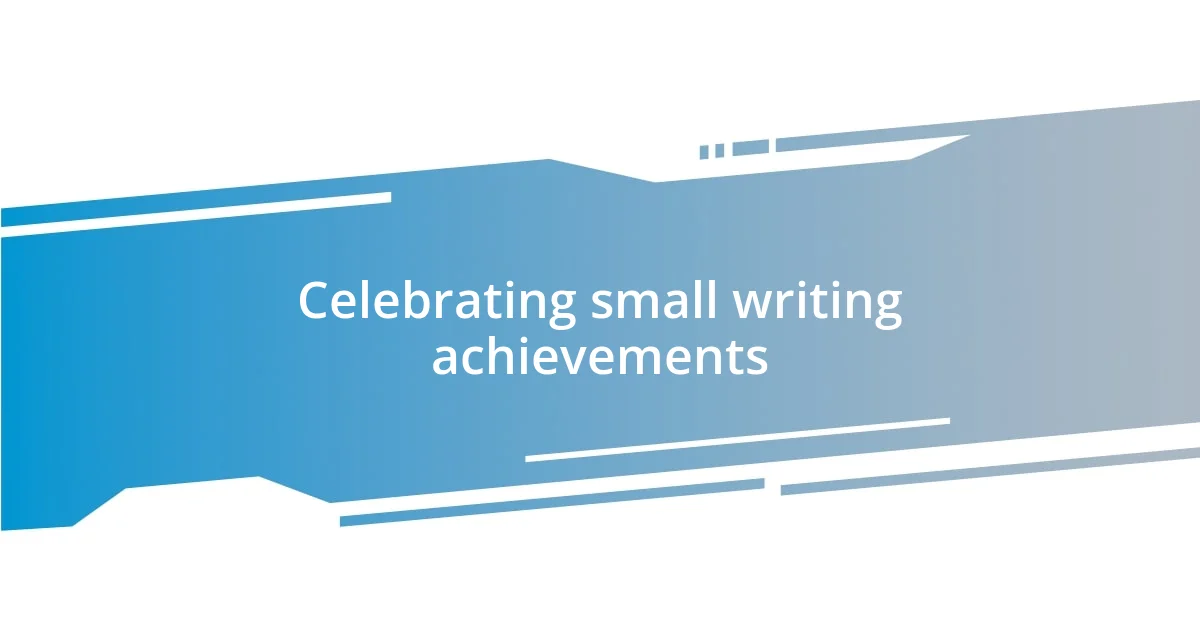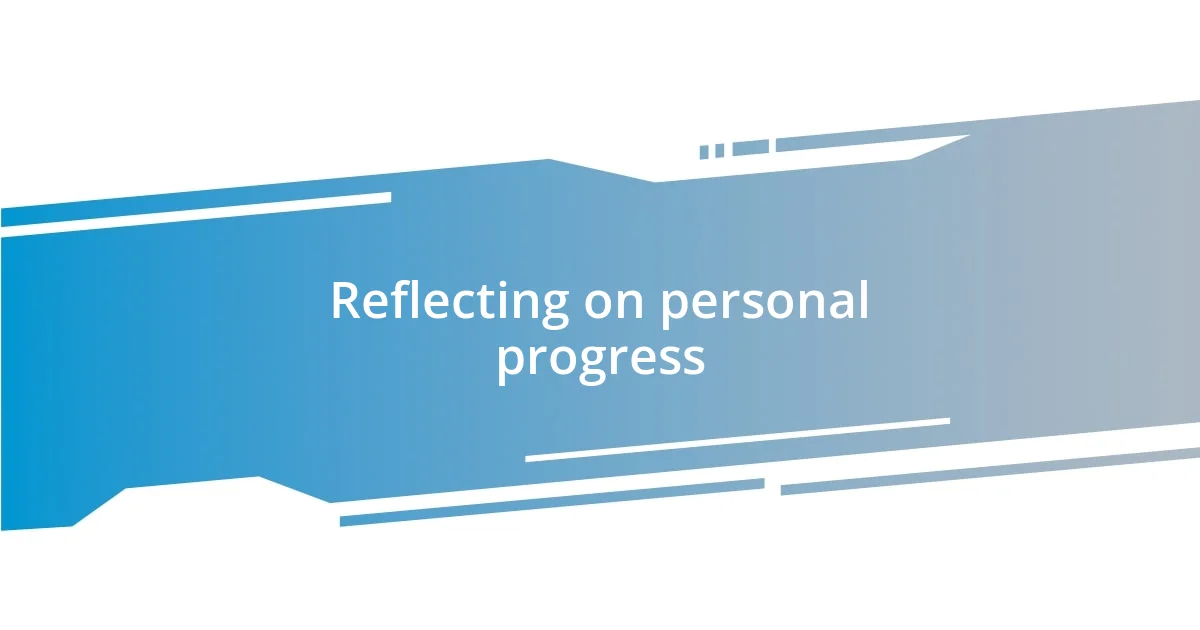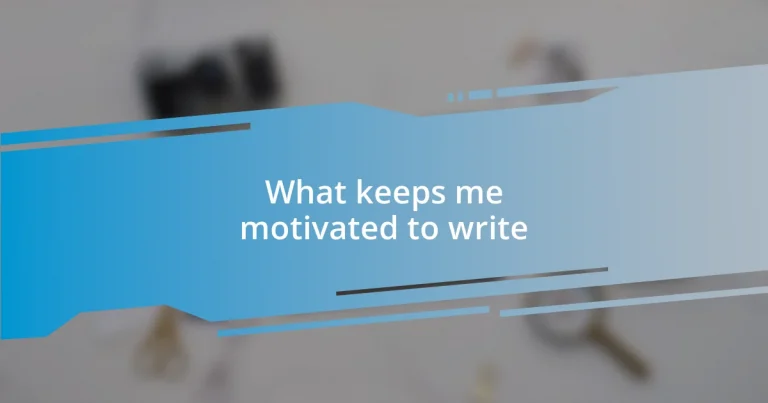Key takeaways:
- Personal motivation for writing can be reignited by setting small, achievable goals and celebrating progress.
- Establishing a daily writing routine and finding a supportive community are crucial for maintaining creativity and motivation.
- Reflecting on personal growth and past achievements helps writers appreciate their journey and boosts confidence in their skills.

Understanding personal motivation
Understanding personal motivation often requires introspection. I remember a time when I struggled to put words on the page, feeling utterly uninspired. In moments like those, I ask myself what truly drives me—what sparks my creativity.
For me, the joy of sharing my thoughts and experiences with others fuels my passion for writing. It’s incredibly fulfilling to think that my words could resonate with someone else, perhaps helping them through a challenging moment or inspiring them to take action. Have you ever felt that rush of excitement when your words create a connection?
I’ve realized that setting small, achievable goals often reignites my motivation. I once committed to writing for just fifteen minutes a day. That small commitment turned into an hour, and then into a flow of creativity where I discovered new ideas. It’s remarkable how starting small can lead to significant breakthroughs in your motivation.

Setting clear writing goals
Setting clear writing goals is essential for maintaining momentum and ensuring that I stay connected to my creative process. When I set specific targets, like completing a chapter or writing a certain number of words each week, I feel a renewed sense of direction. For instance, I once aimed to write a 1,000-word essay within three days. Breaking it down into smaller sections not only made it manageable but also gave me a wonderful sense of accomplishment with each piece I completed.
I find that clarity in my goals prevents me from feeling overwhelmed. Just last month, I decided to tackle a project that had been looming over me for too long. By defining what I wanted to achieve on a daily basis, the entire process became more enjoyable. It felt as if I was embarking on a treasure hunt, where each day I uncovered new insights and ideas, driving me further along my writing journey.
Visualizing my goals also plays a significant role in maintaining motivation. I created a simple chart to track my progress, and seeing those boxes filled in was truly satisfying. It’s gratifying to witness tangible evidence of my hard work. Do you have a method that helps you visualize your writing goals? Engaging with that can provide a powerful boost to your motivation.
| Writing Goal | Description |
|---|---|
| Word Count Target | Setting a daily or weekly word count (e.g., 500 words daily) |
| Project Milestone | Establishing specific milestones for larger projects (e.g., completing a chapter every two weeks) |
| Schedule | Designating writing times to create a routine (e.g., writing for an hour every morning) |
| Feedback Loop | Seeking feedback on completed sections to stay encouraged and on track |

Creating a daily writing routine
Creating a daily writing routine has been a game-changer for me. It’s fascinating how consistency breeds creativity. I once carved out specific blocks of time each day, treating them like sacred appointments. At first, it felt challenging, almost like pulling teeth. But after a few weeks, those moments became a treasured part of my day, where ideas flowed almost effortlessly.
To help you establish your daily writing routine, consider these strategies:
- Choose your time wisely: Find a time when you feel most alert and creative—maybe it’s early morning or late at night.
- Set a timer: Start with just ten minutes if that feels less daunting. Gradually increase the time as you grow more comfortable.
- Create a dedicated space: Designate a quiet, welcoming spot where you can focus on your craft, free from distractions.
- Track your progress: Use a journal or digital tool to note your daily writing achievements, no matter how small.
- Incorporate rituals: Develop a pre-writing routine, like enjoying a cup of tea or listening to calming music, to signal your brain that it’s time to write.
I remember one particularly hectic week when my mind was swirling with distractions. I decided to wake up just thirty minutes earlier to write before the chaos began. Surprisingly, those quiet mornings became my haven where ideas blossomed, and it didn’t take long before I found myself eagerly anticipating those moments each day. It’s amazing how establishing a routine can transform an overwhelming task into a gratifying ritual.

Finding a supportive writing community
Finding a supportive writing community can be a powerful motivator for any writer. I still vividly remember my first writing group meeting; the energy in the room was infectious. I realized that sharing my work with others not only made me feel less isolated but also provided me with invaluable feedback and encouragement. Isn’t it incredible how just a few supportive peers can ignite a spark of motivation?
Connecting with fellow writers online has its own unique advantages. I stumbled upon a virtual forum where writers from across the globe share their struggles and successes. It’s not just about exchanging critiques; it’s a place where I found camaraderie. When a member celebrated finishing a chapter or overcoming writer’s block, it felt like a personal victory for me too. Have you ever experienced that sense of community that just draws you in?
Engaging with a writing community has rekindled my passion on countless occasions. During one particularly challenging phase of my writing journey, a simple comment from a fellow writer provided a fresh perspective that reignited my creativity. Their belief in my potential bolstered my confidence, proving that sometimes, all we need is a little nudge from someone who understands our passion. Wouldn’t it be amazing to find that kind of support? It truly makes all the difference.

Overcoming writer’s block techniques
When I hit a wall with writer’s block, one technique that consistently helps me is changing my writing environment. I recall a day when I felt completely stuck in my usual coffee shop. Instead of forcing it, I decided to relocate to a nearby park. The fresh air and the sounds of nature sparked new ideas, and I often found that a change of scenery can shake loose the cobwebs of my mind. Have you ever noticed how a different setting can breathe life into your thoughts?
Another technique that has worked wonders for me is freewriting. I remember sitting down one afternoon, completely paralyzed by the blank screen staring back at me. So, I began writing whatever came to mind, letting my thoughts flow without any self-editing. At first, it felt like a jumble of nonsense, but gradually, hidden gems emerged from that chaos. It’s liberating to give yourself permission to write badly—what’s most important is the act of writing itself. Have you ever tried letting go of perfectionism in your process?
I also find it helpful to take breaks and engage in activities that fuel my creativity. A day spent sketching or even baking can provide me with a fresh perspective when I return to writing. I remember experimenting with a new recipe once, and the process of mixing ingredients seemed to unlock creative pathways in my mind. Isn’t it interesting how creativity can flourish in unexpected spaces? Embracing these diversions can ultimately help us return to our writing with renewed energy and inspiration.

Celebrating small writing achievements
Celebrating small writing achievements is a vital part of keeping my motivation alive. I recall feeling a rush of joy when I completed my first short story. It wasn’t perfect, but I took the time to reward myself—a small treat and a moment to relish in my accomplishment. Have you ever savored a little victory? These small celebrations remind me that every step matters.
I’ve discovered that tracking progress helps me appreciate even the tiniest victories. One time, I started a simple checklist of daily writing goals. Checking off each item brought a surprising amount of satisfaction, transforming what felt like daunting tasks into joyful milestones. Isn’t it amazing how a little acknowledgment can change your perspective on the journey?
Recently, I decided to share my progress with friends. At one gathering, I casually mentioned finishing a draft. Their enthusiastic cheers made me realize the importance of sharing achievements, no matter the size. This celebration created a supportive atmosphere that encouraged me to keep going. Have you ever felt uplifted by the applause of others? It makes a world of difference, doesn’t it?

Reflecting on personal progress
Reflecting on personal progress can be a transformative practice in my writing journey. I often find myself pausing to look back at the volume of work I’ve created over time. Just the other day, I stumbled upon an old manuscript I had almost forgotten about, and it struck me how much I’ve evolved since those early days. Have you ever experienced that moment when you realize just how far you’ve come? It’s a humbling yet invigorating feeling.
Taking time to assess my growth has also revealed patterns in my writing style and subject matter. When I review past pieces, I can see the whispers of my earlier influences in the margin notes I left for myself. I remember a specific project where my voice felt restrained, almost hesitant. By comparing it to my current work, I can genuinely appreciate the boldness and confidence I’ve developed. Doesn’t it ignite a sense of pride to witness your progress?
Another insightful aspect of this reflection is recognizing and celebrating the lessons learned along the way. I recall the struggles I faced with character development in my stories; it felt like I was drawing blanks. Now, after countless trials and experiments, I embrace the complexity of creating vibrant characters who resonate with readers. Isn’t it fascinating how each challenge we encounter adds to our arsenal of skills? The journey is just as important as the destination, reminding me that every hurdle contributes to my growth.














